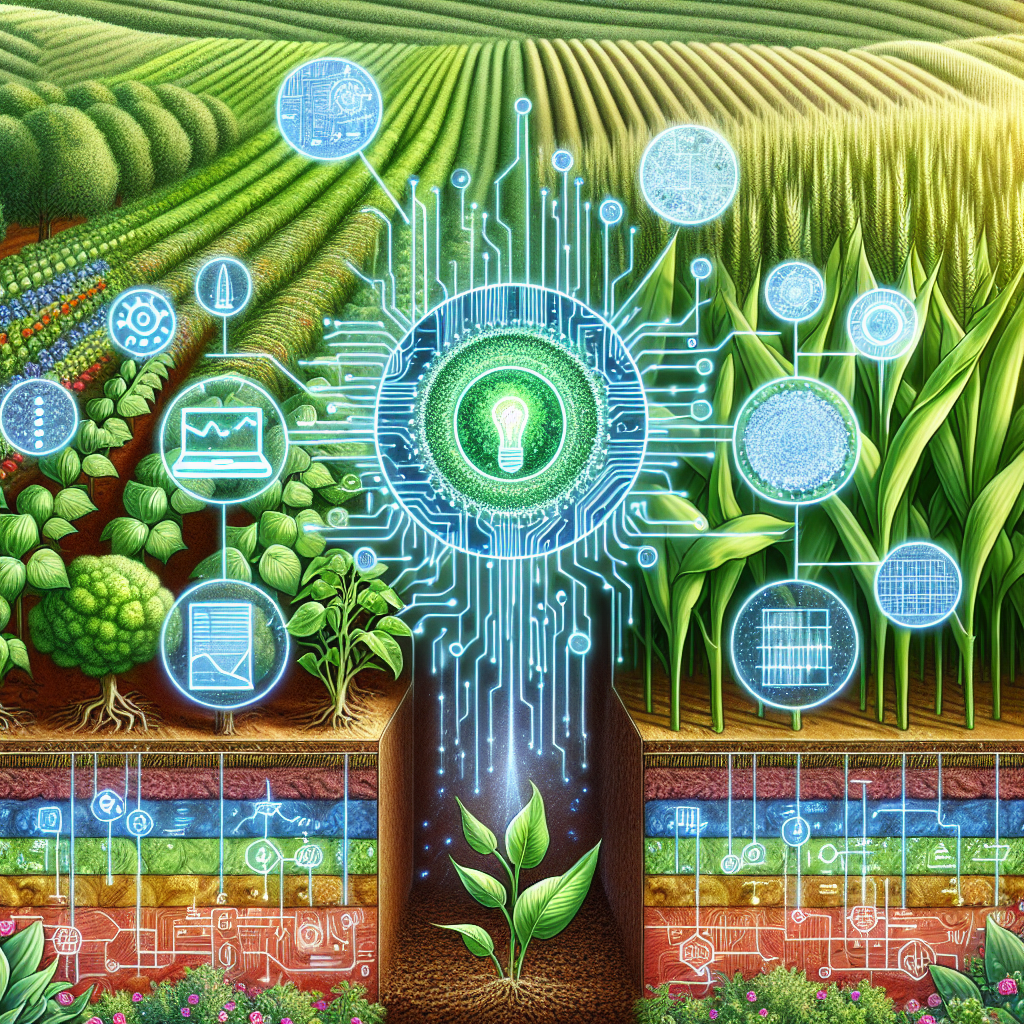Artificial intelligence (AI) has become an increasingly important tool in agriculture, offering new ways to enhance crop nutrition and soil health. By utilizing AI technologies, farmers can make more informed decisions, optimize resource management, and improve overall crop productivity. In this article, we will explore how AI can be used to benefit crop nutrition and soil health, and address common questions about this emerging technology.
Enhancing Crop Nutrition
One of the key ways AI can enhance crop nutrition is through precision agriculture. Precision agriculture involves using technology to manage variability in fields, leading to more efficient use of resources such as water, fertilizer, and pesticides. AI can analyze vast amounts of data from sensors, satellites, and drones to create detailed maps of fields, allowing farmers to apply inputs more precisely. This not only reduces waste but also helps ensure that crops receive the right nutrients at the right time, leading to healthier plants and higher yields.
AI can also be used to predict nutrient deficiencies in crops before they become a problem. By analyzing data on soil health, weather patterns, and crop growth, AI algorithms can identify patterns and make recommendations on when and how to apply fertilizers or other nutrients. This proactive approach can help prevent nutrient deficiencies and optimize crop growth, leading to better overall nutrition and health.
Additionally, AI can help farmers optimize their crop rotation and cover cropping strategies to improve soil fertility. By analyzing historical data on crop yields, soil health, and weather patterns, AI algorithms can make recommendations on which crops to plant when and where, as well as how to manage cover crops to improve soil structure and nutrient cycling. This can help farmers maintain soil health over time, leading to more sustainable and productive farming practices.
Improving Soil Health
AI can also play a crucial role in improving soil health, which is essential for long-term crop productivity. Healthy soil provides a stable structure for plant roots, improves water and nutrient retention, and supports diverse microbial communities that benefit plant growth. By analyzing data on soil composition, moisture levels, and organic matter content, AI algorithms can help farmers identify areas of concern and make recommendations on how to improve soil health.
One way AI can improve soil health is by optimizing tillage practices. Excessive tillage can disrupt soil structure and lead to erosion, compaction, and loss of organic matter. AI can analyze data on soil moisture, compaction levels, and crop residue to make recommendations on when and how to till fields to minimize damage and improve soil health. By reducing tillage, farmers can maintain soil structure and fertility, leading to healthier crops and more sustainable farming practices.
Another way AI can improve soil health is by monitoring soil carbon levels. Soil carbon is a key indicator of soil health, as it provides energy for soil microbes, improves soil structure, and helps retain nutrients. AI can analyze data on soil carbon levels, temperature, and moisture to track changes over time and make recommendations on how to improve soil carbon sequestration. By increasing soil carbon levels, farmers can improve soil health, reduce greenhouse gas emissions, and enhance overall sustainability.
FAQs
Q: How does AI analyze data to improve crop nutrition and soil health?
A: AI uses algorithms to analyze large amounts of data from sensors, satellites, drones, and other sources to identify patterns and make recommendations. By analyzing data on soil composition, moisture levels, crop growth, and other factors, AI can provide insights on how to optimize nutrient management, tillage practices, and other aspects of farming to improve crop nutrition and soil health.
Q: How can farmers implement AI technologies on their farms?
A: Farmers can implement AI technologies on their farms by working with agtech companies that offer AI solutions for precision agriculture, soil health monitoring, and other applications. These companies can provide hardware such as sensors, drones, and satellites, as well as software to analyze data and make recommendations. Farmers can also consult with agronomists and other experts to help interpret data and make informed decisions based on AI insights.
Q: What are the benefits of using AI to enhance crop nutrition and soil health?
A: The benefits of using AI in agriculture include improved crop yields, reduced input costs, enhanced sustainability, and better soil health. By optimizing nutrient management, tillage practices, and other aspects of farming, farmers can improve crop nutrition, reduce waste, and maintain soil fertility over time. This can lead to healthier plants, higher yields, and more sustainable farming practices that benefit both farmers and the environment.
In conclusion, AI offers exciting opportunities to enhance crop nutrition and soil health in agriculture. By analyzing data, identifying patterns, and making recommendations, AI technologies can help farmers optimize nutrient management, tillage practices, and other aspects of farming to improve crop productivity and sustainability. As AI continues to evolve and become more accessible, it will play an increasingly important role in shaping the future of agriculture and ensuring food security for generations to come.

